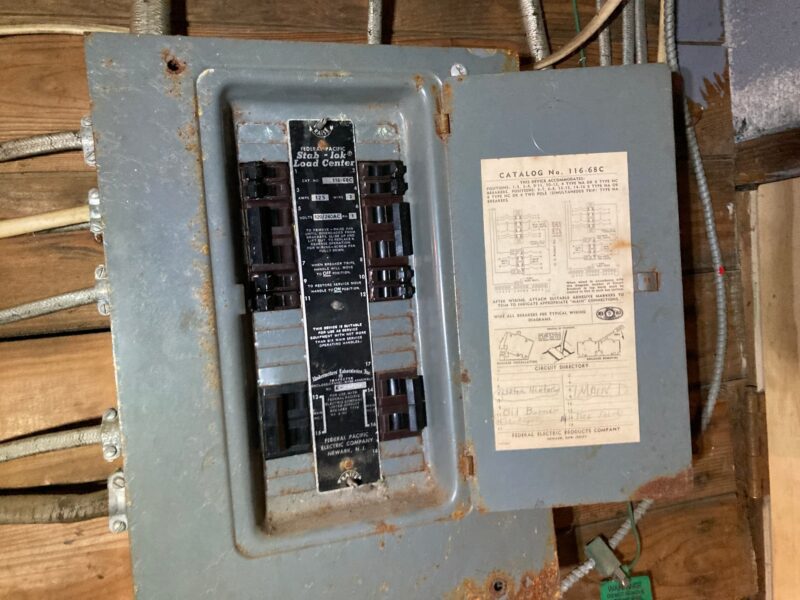Electricity may be invisible, but it sure has a way of making its presence felt, especially when things aren’t working as they should. From flickering lights to tripping breakers, the telltale signs that you might need a circuit panel upgrade are often right under your nose (or behind a flickering light fixture). Our latest blog, Signs It’s Time for a Circuit Panel Upgrade, might sound a bit daunting at first, but don’t worry! We’ll guide you through the most common signals homeowners encounter that point to a panel needing a serious refresh.

Photo credit: InterNachi Inspection Community
For many homeowners, understanding their electrical systems can feel like a code that only licensed electricians can crack. And if your home is a bit older? Well, the mysteries multiply. Older homes were built with wiring and panels to match the needs of the past, and let’s just say the average home in the ‘70s didn’t have anywhere near the electricity load of today’s homes.
So, if you’re experiencing electrical quirks or planning any renovations, knowing when it’s time to call in the pros for a panel upgrade can keep your home running safely and efficiently. Here are the top signs it might be time for an electrical upgrade, along with the key reasons why these issues happen and how an upgrade can set things right.
If You See These, You May Need a Circuit Panel Upgrade
1. Tripping Circuit Breakers: A Not-So-Subtle Hint
Constantly tripping circuit breakers are more than just annoying, they’re a sign that your electrical system is overloaded. When you have too many devices pulling power on a single circuit, the breaker trips to prevent overheating, which could cause a fire. If you’ve noticed that your breakers trip whenever you try to use the microwave and the coffee maker at the same time, it’s likely that your current circuit panel just can’t keep up.
This is especially common in older homes, where panels may only support 100 amps. Modern circuit panels, by comparison, often support 200 amps or more, ensuring a more balanced distribution of power and fewer interruptions. A circuit panel upgrade not only boosts capacity but also spreads out the load more efficiently, reducing the likelihood of trips.
2. An Undersized Panel with No Room for Extra Breakers
If you’re dealing with an undersized panel that’s already crammed to capacity, you’re stuck if you want to add any new circuits. Many homeowners discover this limitation when they start renovations or try to add a major appliance, only to find out there’s no more room in their panel. Without the extra space to accommodate new circuits, you’re at an increased risk of overloading existing circuits, which can lead to both safety hazards and frustration.
Upgrading to a larger panel gives you more flexibility and a more stable foundation to expand your electrical system as needed. A circuit panel upgrade brings peace of mind by offering room to grow, so you can make home improvements without facing electrical restrictions.
3. Flickering or Dimming Lights: Not Just a Halloween Effect
Ever get freaked out by flickering or dimming lights in your home? It can feel a bit spooky, but they’re not a problem to ignore. This issue often means that your circuit panel can’t distribute power evenly, and it could point to damaged wiring or an overloaded circuit. When lights dim or flicker, it usually happens because high-power appliances (like an air conditioner or refrigerator) are drawing too much electricity, leaving less for the rest of the house.
An upgraded panel can provide a steadier, more consistent power supply that prevents these fluctuations. And as an added bonus, stable lighting can help prolong the life of your bulbs and fixtures, too.
4. Old, Outdated Panel: A Blast from the Past
Older circuit panels were built with fewer safety standards than today’s models. If your panel is an original installation from the ‘60s, ‘70s, or even the ‘80s, it’s likely seriously struggling to keep up with modern power demands. Older panels might have aged wiring or components that simply weren’t designed for today’s power needs, and these outdated parts can be prone to overheating and even electrical fires.
Upgrading your circuit panel not only increases your home’s power capacity but also brings your home up to modern safety standards. Modern panels are designed with better technology to handle power loads, which can make a huge difference in your home’s electrical safety.
5. Limited Outlets in the Home: Power Strips Galore
If every corner of your home is sprouting power strips and extension cords, it’s a sign that your panel may not be providing enough outlets for your needs. Many older homes were only wired with a handful of outlets per room, which is far from sufficient for today’s tech-heavy lifestyles.
By upgrading your panel and possibly adding new circuits, you can finally ditch those overloaded power strips. More circuits mean more outlets (and less chance of tripping circuits), giving your home a cleaner, safer setup.
6. Burnt Wires: A Surefire Sign of Trouble
We don’t mean to scare you, but seeing burnt or discolored wires near your circuit panel is a red flag that should never be ignored. Overheating due to excessive electrical loads can cause wires to scorch, which is both a fire risk and a sign that your panel is under stress. The smell of burnt plastic or rubber around your panel could indicate damaged insulation, which is a serious safety hazard.
An upgraded panel can handle more current without overheating, reducing the risk of burnt wires and potential fires. This not only improves safety but also keeps your electrical system running smoothly.
7. Strange Sounds Coming from the Circuit Panel: The Crackle You Don’t Want to Hear
Circuit panels should be silent. If you hear buzzing, crackling, or hissing sounds from the panel, it’s likely that something is wrong. These noises typically result from loose connections, damaged wires, or circuits struggling to handle the load. Strange sounds are a sign of an overworked system, which can lead to arcing. This is a serious fire hazard if not addressed by a professional.
An upgraded panel with modern breakers and wiring eliminates these noises, ensuring safer, quieter operation and reducing fire risks.
8. Fuses Instead of Circuit Breakers: Time to Catch Up
If your home still has a fuse box instead of a circuit breaker panel, it’s definitely time to consider an upgrade. While fuses and circuit breakers both protect your electrical system by interrupting power during overloads, they operate differently.
Fuses are single-use devices that melt when they experience a power surge, requiring manual replacement each time they blow. Circuit breakers, on the other hand, can be reset with a simple switch after tripping, which makes them more convenient and cost-effective over time.
Moreover, fuses lack the advanced safety features that modern circuit breakers provide, such as Ground Fault Circuit Interrupter (GFCI) and Arc Fault Circuit Interrupter (AFCI) protection, which help prevent electrical shocks and fires.
Upgrading from a fuse box to a breaker panel not only increases safety but also aligns your home’s electrical system with today’s power demands, offering peace of mind and a safer, more efficient setup.
9. Power Surges: More Than Just a Nuisance
Frequent power surges can indicate that your current panel isn’t effectively managing the electricity flowing through your home. A power surge is a sudden, brief spike in voltage, often caused by events like lightning strikes, electrical overloads, or even the on-and-off cycling of heavy-duty appliances. When these surges occur, they can damage sensitive electronics and appliances, leading to costly repairs or replacements over time. Persistent surges are often a sign that an older circuit panel isn’t equipped to handle today’s fluctuating demands.
Upgrading to a modern circuit panel provides a more stable, consistent power flow, helping protect your valuable appliances and electronics while reducing the risk of damage from surges.
10. Home Remodel: Boost Your Electrical System Alongside Your Renovations
Planning a remodel? If your home is on the “vintage” side, upgrading the circuit panel is as essential as picking out new paint colors. Let’s face it: older homes weren’t built with today’s high-wattage lifestyles in mind. Back in the day, they just needed to power a few lights, maybe a coffee maker, and a TV the size of a postage stamp. But when you start adding new rooms, updated kitchens, and modern appliances, that old panel can feel like it’s biting off way more than it can chew.
Without a panel upgrade, you might be tripping breakers left and right, dealing with power blips, or worse, risking safety issues. An upgraded panel brings your home into the 21st century, giving you the power to handle all those shiny new appliances and lighting fixtures without a hitch.
So, as you plan for the remodel, remember that giving your circuit panel a little TLC now means your revamped space can shine as brightly as you want it to.
11. Replacing Old Appliances with New, High-Powered Ones
Upgrading older appliances like refrigerators, ovens, and HVAC units might seem like a straightforward way to boost convenience and energy efficiency, but without an updated circuit panel, it could be more of an adventure than you bargained for.
Today’s appliances are designed to be powerhouses, consuming more energy to deliver all the features we love: bigger freezers, high-efficiency cycles, and rapid-cooling fans, just to name a few. An older circuit panel, however, wasn’t built for this level of demand.
Modern electrical codes also have something to say here. For example, code requirements now mandate dedicated circuits for heavy-duty appliances like refrigerators, dishwashers, and washing machines, meaning each needs its own line directly connected to the panel.
This is to prevent overloads and ensure safety, but with an old panel maxed out on capacity, there might not be enough space to add these dedicated circuits. Hence, tripping breakers, power dips, and in some cases, even complete outages become all too common.
A circuit panel upgrade gives your home the power capacity it needs to support all your new, shiny appliances, plus any extras you might want down the road. So, if you’re thinking about leveling up your appliances, make sure your panel’s up for the task, too. It’s a small investment in smooth sailing for years to come!
Why CK Electric Is Your Trusted Electrician for Your Circuit Panel Upgrade
 When it comes to circuit panel upgrades in Central Maryland, CK Electric is your go-to expert. Our team has helped countless homeowners throughout Sykesville and the surrounding areas upgrade their panels for increased safety, capacity, and peace of mind. As a licensed and experienced contractor, we know the ins and outs of modernizing electrical systems while prioritizing safety and efficiency.
When it comes to circuit panel upgrades in Central Maryland, CK Electric is your go-to expert. Our team has helped countless homeowners throughout Sykesville and the surrounding areas upgrade their panels for increased safety, capacity, and peace of mind. As a licensed and experienced contractor, we know the ins and outs of modernizing electrical systems while prioritizing safety and efficiency.
We also believe in putting customers first, and we bring that commitment to every project we take on. From your initial consultation to the final inspection, our goal is to make the entire process easy and stress-free. We listen to your concerns, explain your options, and recommend solutions that fit your unique needs and budget—no unnecessary upsells or surprises. Plus, our skilled technicians stay up-to-date with the latest electrical codes and technology, ensuring your upgrade meets both today’s standards and tomorrow’s demands.
If you’re planning a renovation, dealing with electrical issues, or just want to upgrade your home’s electrical system, CK Electric is here to help. Contact us today! We provide electrical services for the following areas: Sykesville, Westminster, Eldersburg, Ellicott City, Frederick, and all of Central Maryland. Call us at 443-920-3078 or email us at info@ckelectricllc.com. We are happy to serve you!
